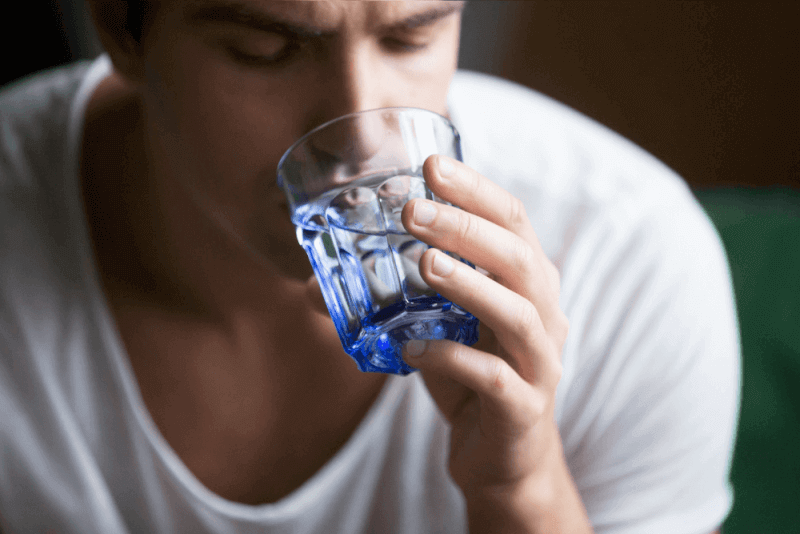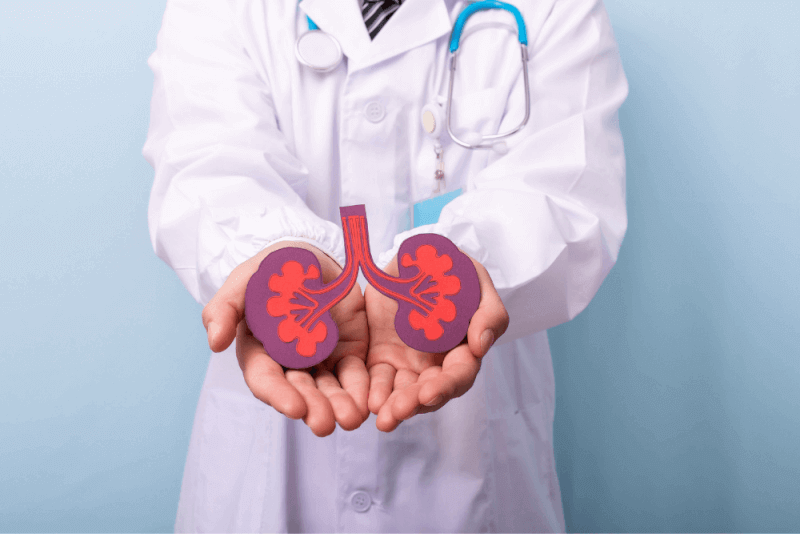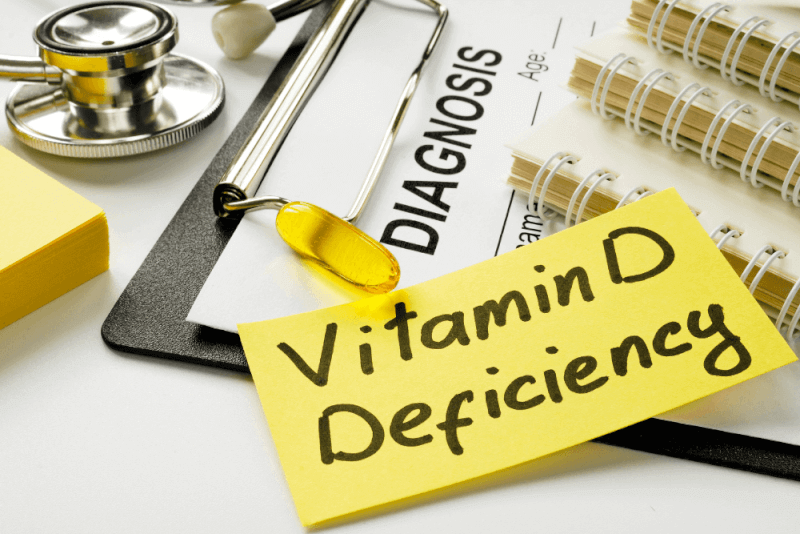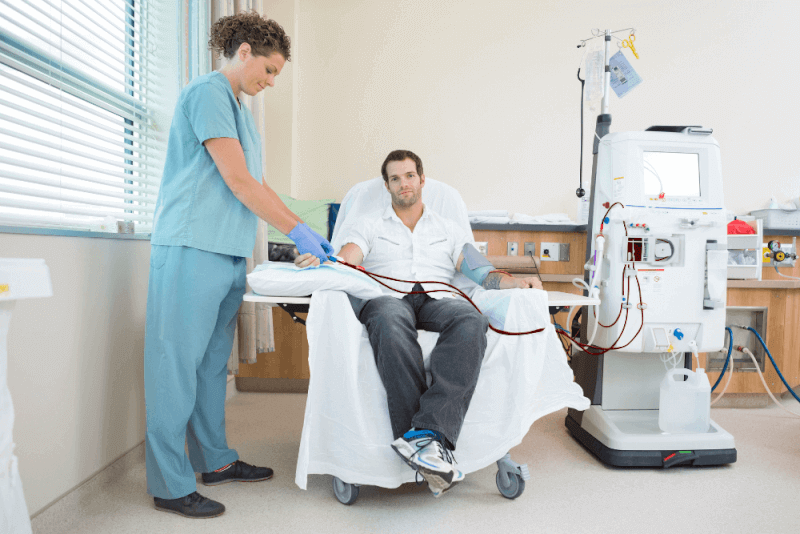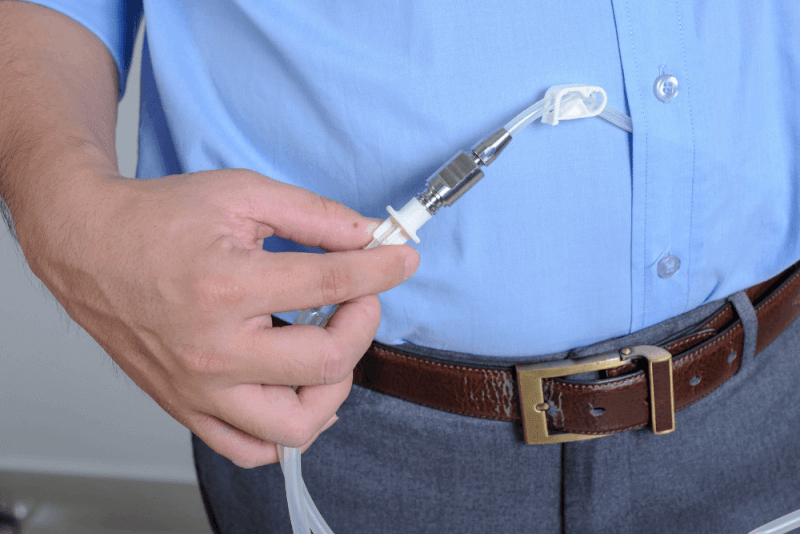30-Second Summary
- The main causes of dehydration in young children are diarrhea and vomiting. In older adults, the main causes include naturally low body water content and medications.
- Thirst is not always a reliable early indicator of the body's need for water. Many people, especially older adults, do not feel thirsty until they are already dehydrated. Therefore, it's important to increase water intake during hot weather or illness.
- Signs of dehydration can often be identified through a physical exam. When a person is dehydrated, they may experience low blood pressure upon standing, faster-than-normal heartbeat, and reduced blood flow to the extremities.
- The only treatment for dehydration is to replace lost electrolytes. The treatment method varies based on the patient’s age and the severity of the dehydration.
What Is Dehydration?
Dehydration occurs when more fluid is lost than is taken in, and the body no longer has enough water and other fluids to carry out its normal functions. Anyone can become dehydrated. However, young children and older adults are at higher risk.
The main causes of dehydration in young children are diarrhea and vomiting. In older adults, the main causes include naturally lower water content in the body and the use of medications. Therefore, even minor illnesses that affect the lungs or bladder can lead to dehydration in older adults.
Importance of Water in the Body
The human body is made up of 78% water. The brain is 73% water, and the heart contains the same amount. Bones are 31% water, muscles and kidneys are 79%, and the skin is 64% water. The lungs are made up of 83% water.
Areas in the body where water is used include:
- Aids digestion and helps remove waste.
- Keeps joints functioning. Water lubricates the joints.
- Used in saliva production.
- Balances body chemicals. The brain needs water to produce hormones and neurotransmitters.
- Helps oxygen reach all parts of the body and protects bones.
- Regulates body temperature.
- Acts as a shock absorber for the brain, spinal cord, and fetus.
Water is especially important for the body in hot weather. It prevents the body from overheating. During exercise, muscles generate heat. To prevent overheating, the body must get rid of this heat. The main way the body releases heat in hot weather is through sweating. When sweat evaporates, it cools the underlying tissue. Excessive sweating reduces the body's water level and can interfere with normal body functions.
Dehydration in Infants
Dehydration can develop quickly in infants. Symptoms of dehydration may include the following:
- Dry or sticky mouth
- Crying with very few or no tears
- Sunken eyes
- Sunken soft spot on the head (fontanelle)
- Fewer wet diapers than usual
- Irritability
- Lethargy
- Dizziness
If dehydration is mild, giving the infant fluids can resolve the issue. However, in severe cases, emergency medical attention is required. Contact a doctor if any of the following occur:
- No food intake for several hours
- Infants under one year consuming only oral rehydration solution for 24 hours
- Vomiting more than a few times within 24 hours
- Not eating any food for 3–4 days
- No signs of improvement
If the infant is unresponsive or does not respond to stimuli, go to the emergency room immediately.
Causes of Dehydration
In some cases, dehydration occurs due to simple reasons. People may not drink enough water because they are busy, or access to safe drinking water may be limited while traveling, hiking, or camping. Other causes of dehydration include the following:
- Severe acute diarrhea, which starts suddenly and intensely, can lead to significant fluid and electrolyte loss in a short time. If vomiting accompanies diarrhea, there is even greater fluid and mineral loss.
- In general, the higher the fever, the greater the risk of dehydration. If fever is present in addition to diarrhea and vomiting, the condition may worsen.
- Sweating causes fluid loss. If intense physical activity is performed and not enough fluids are consumed, dehydration can occur. Hot, humid weather increases sweating and the amount of fluid lost.
- Undiagnosed or uncontrolled diabetes can increase urination frequency. Additionally, medications like diuretics and some blood pressure drugs can lead to increased urination and therefore cause dehydration.
Symptoms of Dehydration
Thirst is not always a reliable early indicator of the body's need for water. Many people, especially older adults, do not feel thirsty until they are already dehydrated. Therefore, it's important to increase water intake during hot weather or illness. The signs and symptoms of dehydration can vary depending on age.
Symptoms in Infants or Young Children
Symptoms that may be seen in infants and young children include:
- Dry tongue and lips
- No tears while crying
- Fewer than six wet diapers per day for infants
- No urination for eight hours in toddlers
- Sunken soft spot on the baby's head
- Sunken eyes
- Dry and wrinkled skin
- Deep and rapid breathing
- Cold hands and feet with mottled appearance
Symptoms in Adults
- Headache
- Delirium
- Confusion
- Fatigue
- Dizziness
- Weakness
- Lightheadedness
- Dry mouth
- Dry cough
- Rapid heartbeat with low blood pressure
- Flushed skin
- Swollen feet
- Muscle cramps
- Heat intolerance
- Chills
- Constipation
- Dark-colored urine
Diagnosis of Dehydration
Symptoms of dehydration can often be identified through a physical examination. If a person is dehydrated, transitioning from lying down to a standing position may result in low blood pressure, a faster-than-normal heart rate, and reduced blood flow to the extremities. To confirm the diagnosis and determine the severity of dehydration, the following tests are performed:
Blood Tests
Blood samples are tested to check various factors, including electrolyte levels and kidney function. Sodium and potassium levels are particularly important in these tests.
Urinalysis
Urine tests help determine whether the body is dehydrated and assess the severity of dehydration. They can also check for signs of bladder infections.
Treatment Methods for Dehydration
The only treatment for dehydration is to replace lost electrolytes. The treatment method varies based on the patient’s age and the severity of the dehydration.
Treatment for Dehydrated Infants and Children
Home treatment methods for dehydrated infants and children include the following:
- Carefully following the doctor’s feeding instructions
- Unless instructed otherwise by a doctor, do not give over-the-counter anti-diarrheal medications to children under two years old.
- Encouraging children to drink flavored fluids
- Continuing to breastfeed infants as usual
- Using electrolyte solutions as recommended by the doctor
- Gradually increasing the amount of fluids and food given to the child
- Giving acetaminophen if the child has a fever
- Avoid giving aspirin to children
- Ensuring the child gets plenty of rest
- Being alert for worsening or recurring symptoms of dehydration
Hospital Treatment
When dehydration is severe, both children and adults may require hospital treatment. Hospital care includes:
- Administering fluids intravenously (IV)
- Correcting electrolyte imbalances
- Giving acetaminophen for fever
- Providing rest
Risk Factors for Dehydration
Dehydration can happen to anyone. However, some individuals are at greater risk.
In Infants and Children
Infants and children, who are the most likely to experience severe diarrhea and vomiting, are naturally more prone to dehydration. Due to their higher surface area-to-volume ratio, they lose more fluids during high fever or burns. Additionally, small children often cannot express that they are thirsty.
In Older Adults
As people age, their body’s water reserves decline. This leads to a reduced sensation of thirst. Furthermore, chronic conditions such as diabetes and long-term use of medications can worsen dehydration. Limited mobility in older adults can also hinder their ability to access water easily.
In People With Chronic Illnesses
Those with uncontrolled or untreated diabetes have a higher risk of dehydration. This can increase the risk of kidney disease. The same applies to medications that cause frequent urination. Even minor illnesses like colds or flu can make patients more vulnerable to dehydration due to decreased food and fluid intake during illness.
In People Who Work or Exercise Outdoors
In hot and humid weather, the risk of dehydration and heat-related illness increases. This is because when the weather is humid, sweat does not evaporate as quickly, which prevents the body from cooling itself efficiently. As a result, body temperature rises and more fluid is needed.
Difference Between Dehydration and Hydrolysis
Hydrolysis is the exact opposite of dehydration. In hydrolysis, there is excess fluid in the body. This condition is also referred to as fluid retention or edema. Hydrolysis occurs when there is an intake of more fluids than the body needs.
Complications of Dehydration
Dehydration can lead to serious complications. Possible complications due to dehydration include:
Heat Injury
Exercising intensely without adequate fluid intake can result in heat cramps, heat exhaustion, or potentially life-threatening heat stroke.
Urinary and Kidney Problems
Long-term or repeated dehydration episodes can cause urinary tract infections, kidney stones, and even kidney failure.
Seizures
Electrolytes in the body help carry electrical signals between cells. An imbalance in electrolytes can disrupt these signals, leading to involuntary muscle contractions or loss of consciousness.
Hypovolemic Shock
The most severe complication of dehydration is hypovolemic shock, a life-threatening condition. It occurs when low blood volume causes a drop in blood pressure and a decrease in oxygen delivery to the body.
How to Prevent Dehydration
To prevent dehydration, it is essential to consume plenty of fluids. Eating water-rich foods such as fruits and vegetables is also recommended. For most healthy individuals, thirst is a sufficient guide. However, in the following situations, people may need to increase their fluid intake:
Vomiting and Diarrhea
If children or adults have vomiting or diarrhea, it is important to provide extra water or oral rehydration solutions at the first signs of illness. Do not wait until dehydration develops.
Exercise
It is best to start hydrating the day before strenuous exercise. Producing large amounts of clear, diluted urine is a good sign of proper hydration. Fluids should be replenished regularly during the activity and continued afterward by drinking water or other fluids.
Hot or Cold Weather
During hot and humid weather, extra water intake helps the body cool down and replenish fluids lost through sweating. In cold weather, additional fluids are needed to counteract moisture loss caused by dry air, especially at high altitudes.
Illness
Older adults are particularly vulnerable to dehydration during even minor illnesses like the flu, bronchitis, or bladder infections. It is crucial to ensure adequate fluid intake in these cases.
Degrees of Dehydration
Experts classify dehydration as follows:
Mild Dehydration
Requires only increased oral fluid intake. Usually, drinking water alone is sufficient. However, if fluid loss is caused by excessive sweating, vomiting, or diarrhea, consuming a beverage that contains electrolytes is recommended. In mild dehydration, patients typically feel better within 5 to 10 minutes after fluid intake.
Moderate Dehydration
In cases of moderate dehydration, intravenous hydration may be required, and visiting an emergency room is advised.
Severe Dehydration
Severe dehydration is identified by very intense symptoms. It often involves serious conditions such as loss of consciousness or seizures. Emergency medical assistance is required in such cases.


